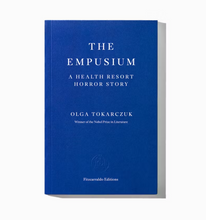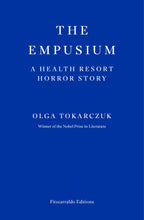In September 1913, a young Polish man suffering from tuberculosis arrives at Wilhelm Opitz's Guesthouse for Gentlemen, a secluded health resort nestled in the Silesian mountains. Here, amidst the crisp mountain air, a peculiar ritual unfolds each evening: residents gather to imbibe the local hallucinogenic liqueur, fueling fervent debates on the great issues of the day. They dissect monarchy versus democracy, ponder the existence of devils, challenge gender roles, and fiercely argue for war or peace.
Yet, beyond the spirited discussions, disturbing events begin to plague the guesthouse and the surrounding hills. An unseen presence—or something far more sinister—seems to be watching, subtly attempting to infiltrate this cloistered world. As the newcomer endeavors to unravel the truths within himself and the chilling mystery of the forces beyond, he remains unaware that they have already chosen their next target.
A century after the publication of Thomas Mann's The Magic Mountain, Nobel laureate Olga Tokarczuk revisits and brilliantly reclaims this iconic territory. THE EMPUSIUM: A HEALTH RESORT HORROR STORY masterfully blends horror, comedy, folklore, and feminist parable into a work of truly exceptional storytelling. This novel is a mesmerizing journey into the heart of a society on the brink, exploring themes of illness, power, gender, and the thin veil between reality and the supernatural.
‘Tokarczuk’s fiction is built on filtering fragments of the past – people, stories, myths, orthodoxies – through a contemporary lens…. The Empusium is much less a debate of ideas than a study of our perception and the limits of sensory experience. Reality, or rather its elusiveness, preoccupies much of Tokarczuk’s work, which frequently blends genres as a way to get closer to, if not at, what’s true…. Grotesque sexism aside, there is spectacular humour to these scenes as the grandeur of their self-image is so elegantly undermined by the narrator’s description of them…. This too is a novel that in Tokarczuk’s dexterous hands transcends its own limits, further cementing the Nobel laureate as one of the most original storytellers of our age.’ Matthew Janney, Financial Times
‘Despite the large (if mischievous) debt to The Magic Mountain, Tokarczuk makes this novel all her own with her idiosyncratic blend of registers and genres. She is both a collagist and a doodler, a freewheeling improvisator taking her narrative line for a gloriously erratic walk…. In Lloyd-Jones’s poised translation, Tokarczuk’s puckishness gleams brightly. The best passages in this new novel are weird, lyrical rhapsodies describing the natural world through the all-seeing eyes of those mysteriously plural narrators…. Happily, all the various unlikely strands come together in the closing chapters. The eerily majestic finale is haunting, cathartic and gleeful – a zany confection that could only have come from this unpredictable, unique writer.’ Claire Lowdon, Times Literary Supplement
Physical Info:5.04 x 1.02 x 7.8 inches | 336 Pages | Paperback




